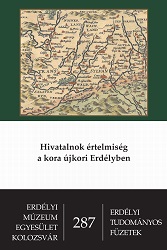A szigeti Bartos család: társadalmi felemelkedés az erdélyi
fejedelmi hivatalnokság alsó rétegében a 16–17. század fordulóján
The Bartos de Sziget Family: Upward Mobility in the Lower Class of Princely Officials in Transylvania at the Turn of the 16th and 17th Centuries
Author(s): László Glück
Subject(s): 16th Century, 17th Century
Published by: Erdélyi Múzeum-Egyesület
Keywords: Bartos de Sziget Family; Princely Officials
Summary/Abstract: The service of the king played a particular role in upward social mobility in premodern Hungary, as the monarchs – thanks to the specific sovereign rights – had opportunities not comparable with that of the other members of society to reward subjects dear to them. Many commoners also managed to acquire nobility or seigneurial rights in the 15th and 16th centuries, thanks to their erudition (literacy and proficiency in Latin) which made it possible for them to be employed in the monarchic administration. The government of the Principality of Transylvania, a new state that emerged in the eastern part of Hungary in the mid-16th century, played a similar role. The present study gives the history of a family as an example of this.The father lived in Sziget, a small town in the north-eastern region of Hungary, and his profession possibly was that of a saddler. His sons were given an education. Péter started working at the Princely Treasury as an auditor (rationista), György supposedly served in the Princely Chancellery as a scribe, and István had been the private secretary to lords, and then worked as a scribe of the Princely Chancellery. The father already had been ennobled by a charter (this was usual among craftsmen from the end of the 16th century), and his sons were granted exemption for their plots in Sziget by the Prince. After the untimely death of the two elderly brothers, only István remained alive; he was awarded with estate donations as well by the Prince, and then entered into a marriage with a noblewoman from a well-to-do seigneurial family, inheriting landed properties by his marriage as well. After all, he used the cash from his father’s heritage or his court service to purchase the landed properties from different landlords being in difficulties. He attached great importance to good farming on the acquired landed properties. Old seigneurial families immediately accepted him, the homo novus, as one of them: this is clearly shown by the marriages of István and his children.
Book: Hivatalnok értelmiség a kora újkori Erdélyben
- Page Range: 97-109
- Page Count: 13
- Publication Year: 2017
- Language: Hungarian
- Content File-PDF

